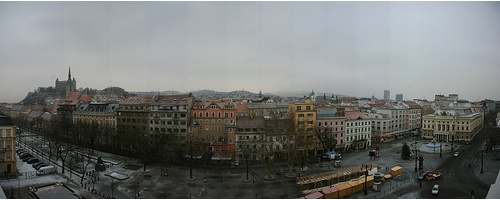Or as the cover has it: The Wooden Village (Rivers of Babylon 2). That’s because it’s the sequel to Rivers of Babylon, which I read recently, and book two of a trilogy.
Rivers of Babylon, you may remember, follows a character called Rácz as he fights his way up from stoking the boilers of a big hotel in Bratislava to become a powerful businessman/crime lord. The Wooden Village focuses on one of the minor characters from that novel: Freddy Piggybank, who works in the hotel car park.

I didn’t think it was quite so successful; it suffers not so much from the absence of Rácz as a character but the lack of an equally compelling narrative framework. Rivers of Babylon had a whole cast of minor characters and subplots, but it was held together by the remorseless rise of Rácz; I don’t think the second book has such a strong core. The tone has shifted a bit, too; it’s still scathing and vulgar and energetic, but it seems to have lost the ferocious anger that powered the first book. It feels like a shift away from satire towards farce.
Anyway, here’s an extract. Freddy has just been told that the council is closing the car park and that he will therefore be losing his job:
Freddy sits there lifelessly. Only now does he feel the whole impact of his cruel fate. This is the end of Freddy. Life will not be worth living now. Where will he go? What will happen to him? Back to the brickyard? They’re laying off workers there. And his parents? What will his parents say? The vein in his head begins to pound dangerously. Freddy should be taking his medication, but he just sits there. I might as well croak, he thinks, full of self-pity. He imagines big headlines in the daily papers: BANKRUPT CAR PARK ATTENDANT DIES ON HIS LOT!.. HE ONLY WANTED TO LOOK AFTER CARS!.. ANOTHER VELVET REVOLUTION VICTIM? Yes, he’ll probably die here. The bitch from town council will read the paper and her conscience will bother her until she dies. Freddy wallows in his misery and rather pleasant self-pity. His chest heaves mightily a few times and he sighs with sadness. No, Piggybank realises, his death will not be headline news. Maybe some paper will have a little piece about it in the miscellaneous section: MENTALLY DISTURBED MISER DIES OF STROKE IN CAR PARK. Or something like that.
Freddy makes a decision. He will survive. He won’t allow his tragic death, a number one event for him, to become a source of entertainment fro some fool having his morning coffee. No! Freddy will fight. He will have revenge on this fucking government for this humiliation. He will live off crime. He will sink deep into the muck. He will steal and so on, until they catch up with him and lock him up in jail. And he’ll die in jail. As a sort of silent protest. As an example of what this government did to an honest businessman, Alfred Mešťánek, who only wanted to guard cars until his death and make an honest living. From now on, no wickedness will be wicked enough for Freddy!
I’d certainly recommend you read Rivers of Babylon, and if you enjoy that, you’ll probably enjoy this one too; it’s just not as good, I think.
» The photo of a sex shop in Bratislava is © Mark Pozzobon and used under a CC by-nc-sa licence. I don’t seem to have mentioned it in this post, but The Wooden Village has a lot of stuff about the sex trade, which is why the photo seemed relevant.
